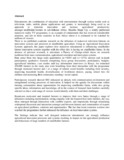Can the TV makeover format of edutainment lead to widespread changes in farmer behaviour and influence innovation systems? Shamba Shape Up in Kenya

View/
Date
2018-07Author
Clarkson, G.
Garforth, C.
Dorward, P.
Mose, George N.
Barahona, C.
Areal, F.
Dove, M.
Metadata
Show full item recordAbstract
Edutainment, the combination of education with entertainment through various media such as television, radio, mobile phone applications and games, is increasingly being used as an approach to stimulate innovation and increase agricultural productivity amongst smallholder farmers in sub-Saharan Africa. Shamba Shape Up, a widely publicised makeover reality TV programme, is an example of edutainment that has received considerable attention, and airs in three countries in East Africa where it is estimated to be watched by millions of viewers.
There is no published academic research on the influence of makeover television formats on innovation systems and processes in smallholder agriculture. Using an Agricultural Innovation Systems approach, this paper explores how makeover edutainment is influencing smallholder farmer innovation systems together with the effect this is having on smallholder farms. In the absence of previous research, it articulates a Theory of Change which draws on research traditions from mass communication, agricultural extension and innovation systems.
Data came from two large scale quantitative (n = 9885 and n = 1572) surveys and in-depth participatory qualitative research comprising focus group discussions, participatory budgets, agricultural timelines, case studies and key information interviews in Kenya. An estimated 430,000 farmers in the study area were benefiting from their interaction with the programme through increased income and / or a range of related social benefits including food security, improving household health, diversification of livelihood choices, paying school fees for children and increasing their community standing / social capital.
Participatory research showed SSU enhanced an already rich communication environment and strengthened existing processes of innovation. It helped set the agenda for discussions within farming communities about opportunities for improving smallholder farms, while also giving specific ideas, information and knowledge, all in the context of featured farm families carefully selected so that a wide range of viewers would identify with them and their challenges.
Broadcasts motivated and inspired farmers to improve their own farms through a range of influences including entertainment, strong empathy with the featured host farm families, the way ideas emerged through interaction with credible experts, and importantly through stimulating widespread discussion and interaction amongst and between farmers and communities of experts on agricultural problems, solutions and opportunities. The fact that local extension workers also watched the programmes further enhanced the influence on local innovation systems.
The findings indicate that well designed makeover edutainment can strongly influence agricultural innovation processes and systems resulting in impact on the agricultural production and behaviours of large numbers of smallholder farmers.
URI
https://www.sciencedirect.com/science/article/abs/pii/S0264837717315144https://www.researchgate.net/publication/325597713_Can_the_TV_makeover_format_of_edutainment_lead_to_widespread_changes_in_farmer_behaviour_and_influence_innovation_systems_Shamba_Shape_Up_in_Kenya
https://www.aminer.cn/pub/5c757541f56def97989d3507/can-the-tv-makeover-format-of-edutainment-lead-to-widespread-changes-in
http://hdl.handle.net/123456789/4582
Collections
- Journal Articles (BE) [333]
